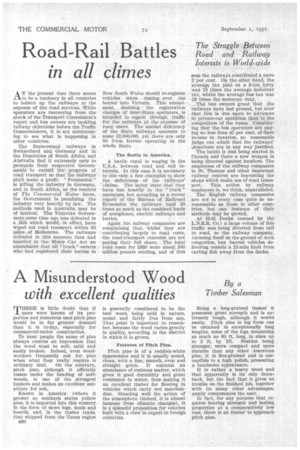Road-Rail Battles in all climes
Page 48

If you've noticed an error in this article please click here to report it so we can fix it.
The Struggle Between Road and Railway Interests is World-wide
AT the present time there seems to be a tendency in all countries to bolster up the railways at the expense of the road services. While operators are recovering from the shock of the Transport Commission's report and bus owners are tackling railway objections before the Traffic Commissioners, it is not uninteresting to see what is happening in other countries.
The State-owned railways in Switzerland and Germany and in the Dominions of South Afriea and Australia find it extremely easy to persuade their respective Governmeat; to curtail the.. progress of read transport so that the railways shall make a profit. " Persuasion" is killing the industry in Germany, and in South Africa, as the readers of The Commercial Motor know, the Government is penalizing the industry very heavily by law. The methods used. in Australia may be of interest. The Victorian Government,some time ago was defeated in a Bin which would,in effect, have wiped out road transport within 50 miles of Melbourne. The railways defeated in this measure then had iriserted, in the Motor Car Act an amendment that all" truck." owners who had registered their lorries in New South Wales should re-register vehicles when coming over the border into Victoria. This amendment, doubling the registration• charges of inter-State operators, is intended to regain through traffic for the railways at the expense cif road users. The annual deficiency of the State railways amounts to some 12,000,000, yet there are only 50 5-ton lorries operating in the whole State.
The Battle in America.
A battle royal is waging in the U.S.A.. between road and rail interests. In this case it is necessary to cite only a few eiamples to show the unfairness of the railways' "claims. The latter state that they have lost heavily to the " truck " operators, but according to it recent report of the Bureau of Railroad Economics the railways haul 50 times as much as the combined loads of aeroplanes, electric railways and lorries.
Again the railway companies are complaining that, whilst they are contributing largely to road costs, the road-transport concerns are not paying their full share. The total road costs for 1930 were about 300 million pounds sterling, and of this
sum the railways contributed a mere 2 per cent. On the other hand, the average tax paid on a 3-ton lorry was 18 times the average motorcar tax, whilst the average bus tax was -23 times the motorcar duty.
The bus owners grant that the railways have lost ground, but aver that this is due more to advances in private-car operation than to the competition. of the buses. Considering that the bus operators are pay-ing no less than 45 per cent. of their income in taxation, no reasonable judge can admit that the railways' objections are in any way justified.
The battle is just being started in Canada and there a new weapon is being directed against hauliers. The employees of the railway companies in St. Thomas and other important railway centres are boycotting the shops which make use of road transport. Ms action by railway employees is, we think, unparalleled.
The English railway companies are not in every case quite so unreasonable as those in other countries, but one instance of their methods may be quoted.
At Hull Docks (owned by the L.N.E.R. Co.) a large volume of fish, traffic was being diverted from rail to road, so the railway company, excusing itself on the ground of dock congestion, has barred vehicles delivering outside a 12-mile limit from carting fish away from the docks.




































































































